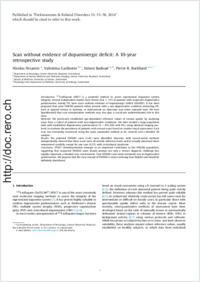Scan without evidence of dopaminergic deficit: A 10-year retrospective study
- Nicastro, Nicolas Department of Neurology, Geneva University Hospitals, Switzerland
- Garibotto, Valentina Department of Nuclear Medicine and Molecular Imaging, Geneva University Hospitals, Switzerland - Faculty of Medicine, University of Geneva, Switzerland
- Badoud, Simon Department of Neurology, Geneva University Hospitals, Switzerland - Physiology Unit, Department of Medicine, University of Fribourg, Switzerland
- Burkhard, Pierre R. Department of Neurology, Geneva University Hospitals, Switzerland - Faculty of Medicine, University of Geneva, Switzerland
-
07.07.2016
Published in:
- Parkinsonism & Related Disorders. - 2016, vol. 31, p. 53–58
English
123I-ioflupane SPECT is a powerful method to assess nigrostriatal dopamine system integrity. Several independent studies have shown that 1–15% of patients with suspected degenerative parkinsonism, mainly PD, have scans without evidence of dopaminergic deficit (SWEDD). It has been proposed that most SWEDD patients either present with a non-degenerative condition mimicking PD, such as atypical tremor or dystonia, or demonstrate an abnormal scan when repeated later. We here hypothesized that scan interpretation methods may also play a crucial yet underestimated role in this issue.Methods We previously established age-dependent reference values of striatal uptake by analyzing scans from a cohort of patients with non-degenerative conditions. We then studied a large population with well-established degenerative parkinsonism (N = 410, 80% with PD), using identical imaging protocol, to evaluate the prevalence of patients with normal scans based on routine visual assessment. Each scan was eventually reassessed using the same automated method as for controls and a detailed 3D analysis.Results Ten potential SWEDD cases (2.4%) were identified. However, both reassessment methods independently showed that these scans were all outside reference limits and/or visually abnormal when reexamined carefully, except for one case (0.2%) with corticobasal syndrome.Conclusion SPECT misinterpretation emerges as an important contributor to the SWEDD population, suggesting that suspected SWEDD cases should prompt not only a serious diagnosis challenge but, equally important, a detailed scan reassessment. True SWEDD cases seem extremely rare in degenerative parkinsonism. We propose that the very concept of SWEDD is more confusing than helpful and should be definitely abandoned.
- Faculty
- Faculté des sciences et de médecine
- Department
- Département de Médecine
- Language
-
- English
- Classification
- Biological sciences
- License
-
License undefined
- Identifiers
-
- RERO DOC 278626
- DOI 10.1016/j.parkreldis.2016.07.002
- Persistent URL
- https://folia.unifr.ch/unifr/documents/305396
Statistics
Document views: 134
File downloads:
- pdf: 305
